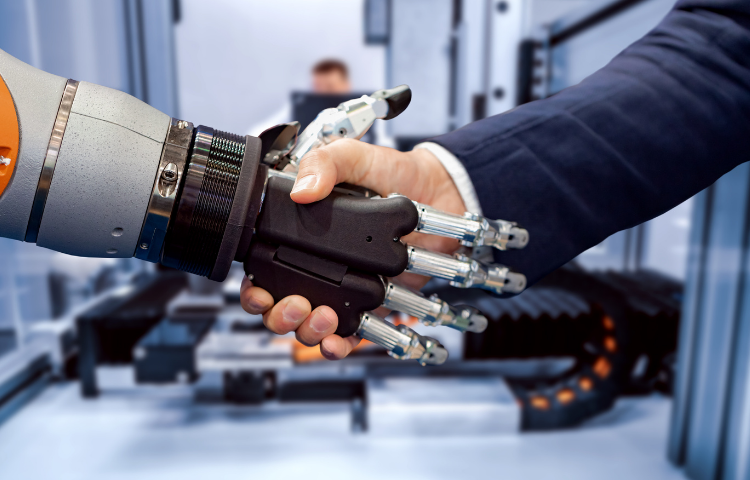

Prefer to listen instead? Here’s the podcast version of this article.
In the entertainment industry, artificial intelligence or AI is commonly associated with sci-fi movies featuring human-like robots that are bent on world domination. On the other hand, news articles often link artificial intelligence to replacing human jobs with all-knowing machines. Both of these are misconstrued concepts that give artificial intelligence a bad rap.
In reality, artificial intelligence is an affordable and accessible resource that companies are becoming increasingly reliant on to solve various challenges. Let’s dive into five ways to incorporate artificial intelligence into a small or medium-sized business.
With more employees working from home, cybersecurity is more important than ever. Most employees are not working on their company’s secured wifi, which assists in protecting confidential information. Working on a less secure network leaves computers and their data vulnerable to hackers. For example, hackers use armies of internet bots that continuously work to poke holes into systems and access restricted data. Once these bots infiltrate the servers, they install a lock. Companies usually have to send the hackers money to regain access to their data.
Artificial intelligence can protect your network by creating bots to scope out weaknesses in your network. Once a vulnerability is detected, they will flag them before you do get hacked. So instead of being reactive, artificial intelligence allows companies to be proactive in defending themselves and their employees.
Hiring employees can be a lengthy and stressful process. Not only does it take a great deal of time and money to research and interview candidates, but if a new hire is not a good match, it can be expensive to rehire and train a new employee.
This is where artificial intelligence enters the equation. Artificial intelligence can pull together the best candidates from various sources, such as thousands of online job boards. Once the best candidates are filtered in, artificial intelligence can narrow down candidates using a variety of different methods. For example, software such as Appliqant utilizes automated video interviews of candidates, comparing personality profiles to that of a company, analyzing resumes, examining skills assessments, and more. After a full assessment is compiled and artificial intelligence identifies the top selections, companies are only left with interviewing candidates and picking the best person for the job. Artificial intelligence provides hiring managers more time to focus on day-to-day tasks instead of the recruiting and hiring process.
Marketing is an essential aspect of any business, and there are countless different marketing tactics from which to choose. Whether it is television ads, digital marketing campaigns, social media, or public relations. With so many options available, it can be challenging to determine the best choices and how to allocate valuable resources properly.
Artificial intelligence benefits marketing teams because it can analyze data that might otherwise go undiscovered. Artificial intelligence can collect and study data on customers that enter a physical store, visit an e-commerce site, or have an online presence (such as social media). By analyzing customer data and behaviors, AI helps marketers identify and target the customers most likely to convert into buyers. AI also determines where the marketing dollars have the greatest return on investment, which takes the guesswork out of marketing.
It is important to note that this technology does not have to be created from scratch. Tools already exist in the marketplace, such as Conversica, Gong, Node, ScaleX, and Cortex. If leveraged correctly, these tools can be combined to build a personal and holistic analytical solution for any company.
One of the most popular ways to incorporate artificial intelligence into customer service is using text chatbots. When chatbots first debuted, they would commonly respond to consumers with fixed responses and were tasked with connecting consumers to the right customer service representative. For example, consumers would go to a company’s website and begin a conversation with a bot. If the consumer told the bot they wanted to talk with someone, the bot would respond with fixed answers such as…
“Would you like to make a return?”
“Do you want to place an order?”
“Do you want to call customer service?”
Depending on the consumer’s answer, the bot would transfer the consumer to the appropriate department where a human employee would begin to solve the issue.
However, the chatbot’s goal now is to see how far it can go without having a human employee intervene. Therefore, bots can now respond to unstructured questions that are more advanced than basic inquiries. All of which can be accomplished without needing human assistance to complete consumer requests. This allows human customer service agents to focus their time and efforts on the most complex cases. Lastly, chatbots enable companies to answer consumers 24/7, thus improving response time, which enhances the customer experience.
Predictive analytics is made possible by artificial intelligence, and they are vital to inventory and delivery management. Predictive analytics can identify trends and patterns in the market by looking at data (the more data, the better) to predict which products will be needed over a period of time. This allows companies to manage orders and inventory more accurately, thus ensuring all future requests can be fulfilled without possessing excess stock.
There is also predictive maintenance when artificial intelligence predicts when a machine will need maintenance and identifies the optimal cycle for maintaining machines. Therefore, the likelihood of a machine breaking and consequently delaying production or shipping is significantly reduced. Lastly, artificial intelligence helps with quality checks. Machines can be trained to scan products and identify imperfections before leaving the factory, therefore reducing human error in spotting faulty products.
Artificial intelligence is an extremely versatile tool that is implemented to solve a myriad of issues and make processes more efficient. It can save your business time and money while simultaneously maximizing revenue opportunities. Whether you want to improve targeting sales and marketing tactics, customer service, the hiring process, inventory and delivery management, cybersecurity, or another aspect of your business, there is a substantial chance artificial intelligence can help. Artificial intelligence is vital for the future of business, so implementing it in various capacities will help your company stay ahead of the curve.
WEBINAR